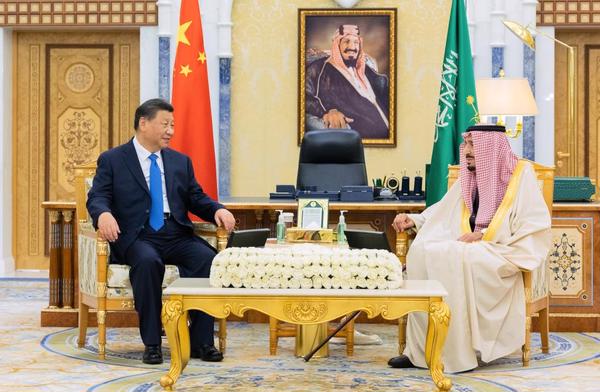Brent on track to post biggest weekly loss since July
Front-month ICE Brent has decreased by another $1.34/bbl on the day, to $76.16/bbl at 09.00 GMT. The futures contract has shed 10% in the past week and not traded lower since January.

PHOTO: Chinese President Xi Jinping meeting with Saudi Arabia's King Salman bin Abdulaziz Al Saud at Riyadh's al-Yamamah Palace in Saudi Arabia. Xinhua
Upward pressure:
Chinese and Saudi Arabian top officials deepened their ties during the China-Saudi Summit in Riyadh. Saudi Arabia and China, the world's largest crude supplier and consumer, respectively, discussed crude oil among other things during Chinese President Xi Jinping's first trip to Saudi Arabia in seven years.
China's Xinhua state news agency reports that China will "expand the scale of crude oil trade" with Saudi Arabia as part of its energy partnership, citing Jinping.
Speaking to Saudi Arabia’s official news agency Saudi Press Agency, the Kingdom’s energy minister Abdulaziz bin Salman has affirmed that relations between Saudi and Chinese are “witnessing a qualitative leap.” He added that Saudi will remain China’s “credible and reliable partner” and that the two nations will enhance cooperation to maintain stability in the global oil markets.
As China relaxes Covid-19 restrictions and rekindles hopes of a domestic oil demand recovery, a strategic partnership could boost Saudi Arabia's crude exports to China and reduce its imports from other markets such as Russia.
Downward pressure:
Oil market sentiment has been soured by concerns about oversupply and an imminent recession hurting demand. Brent values have plummeted to their lowest levels since 2022 as analysts, bankers and economists predict a mild to serious recession for the US and Europe next year.
According to US Treasury Secretary Janet Yellen, a recession is inevitable next year in the US. An economist survey by the Wall Street Journal found 63% of respondents expecting a recession next year. Major investment banks have also cautioned against a potential recession this week.
The G7 price cap is unlikely to have a significant impact on Russia, according to Russian ministers. As reported by the Russian state news agency TASS, the country's First Deputy Energy Minister Pavel Sorokin has told reporters: "The majority of markets are available for our oil based on adequate market principles, and any fluctuations in production are not critical and will not exceed those recorded in the spring."
It was reported earlier this week by TASS that Russia's Deputy Prime Minister Alexander Novak said that oil production could see a decline amid uncertainty, but it will not be "significant." Novak was quoted as saying, "We're doing everything to keep oil sales at the levels we've reached in 2022."
By Konica Bhatt
Please get in touch with comments or additional info to news@engine.online





